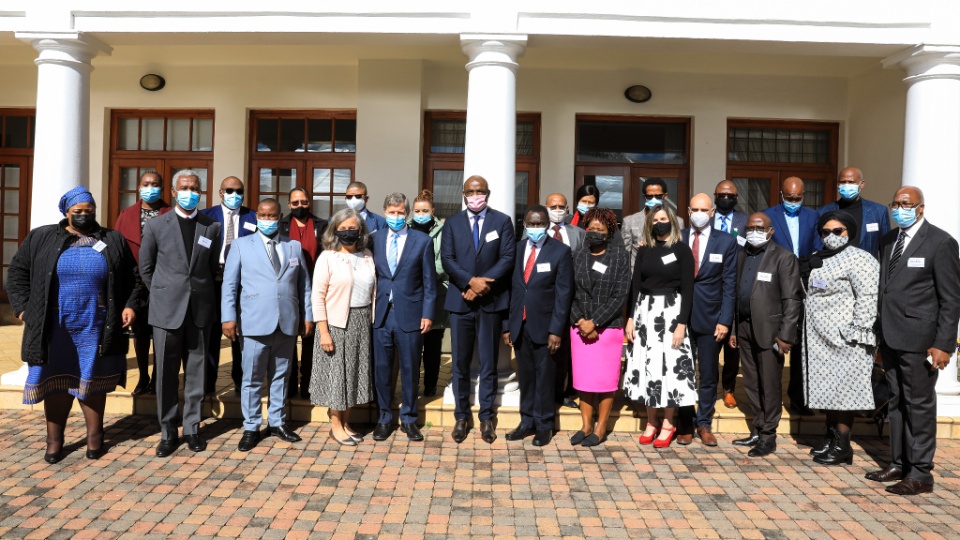
Premier Zamani Saul (centre) and colleagues from the provincial government of the Northern Cape in South Africa, along with leaders of The Church of Jesus Christ of Latter-day Saints in Africa South.
Premier Zamani Saul (centre) and colleagues from the provincial government of the Northern Cape in South Africa, along with leaders of The Church of Jesus Christ of Latter-day Saints in Africa South. © 2021 by Intellectual Reserve, Inc. All rights reserved.The Africa South Area presidency of The Church of Jesus Christ of Latter-day Saints and local Church authorities welcomed the Premier of South Africa’s Northern Cape province – Dr Zamani Saul – along with several of his most senior staff members on Thursday 3 June. The provincial government delegation, which included several members of the executive committee (MECs) toured the Area offices, learned more about some of the Church’s key programmes and used their existing partnership to explore opportunities for further collaboration.
“The primary reason we are here is because of the first visit by The Church [of Jesus Christ of Latter-day Saints] to the province and the contributions they have made to the disaster-struck areas [there],” said Premier Saul. “We are deeply impressed with the kind of work that they have done and the generosity that they have shown to the affected communities.”
A lifeline for flood victims
In May, The Church of Jesus Christ of Latter-day Saints donated 10,000 food parcels to the victims of tropical storm Eloise that flooded several towns in the Northern Cape and ravaged at least 370 homes in the province earlier this year. Each food parcel was designed to support a household of people for five weeks. In addition, the Church donated 5,000 blankets and 3,000 mattresses to the victims. The donations were made through LDS Charities, a Humanitarian outreach organisation sponsored by the donations of Church members worldwide.
This is the first of a two-stage project that the Church will support in the Northern Cape this year, working alongside the provincial government. The second phase will see the Church funding the renovation of 10 flood-damaged schools in the province.
| Temple Square is always beautiful in the springtime. Gardeners work to prepare the ground for General Conference. © 2012 Intellectual Reserve, Inc. All rights reserved. | 1 / 2 |
‘Social compacting can help overcome massive challenges’
Mr Bafedile Lenkoe, the Head of Department at the Northern Cape’s Department of Cooperative Governance, Human Settlement and Traditional Affairs (CoGHSTA) said that the food parcels had been provided to vulnerable people giving special consideration to the elderly, people living with disabilities, child-headed households, victims of the recent floods, farming communities and asylum seekers. No one was turned away.
“It was irrespective of race; colour – as long as it was a human being that was in that jurisdiction during distribution, the person got a parcel,” Mr Lenkoe told the Area Presidency and colleagues.
“You could see the facial expression of those recipients. Really, they were very much appreciative.” Mr Lenkoe said that the project was a collaborative effort. “Disaster management is not only about pumping in money, it is about mobilising all the resources,” he said.
Elder Palmer, the Area President of the Africa South Area of The Church of Jesus Christ of Latter-day Saints, said that the project feedback from the provincial government helped to ensure that the donations went where they were intended and accomplished what they had intended. “There’s no point in doing projects if, afterwards, we are not accountable,” he said.
Dr Saul said that the Northern Cape faces “massive challenges of underdevelopment” – ones that could only be adequately addressed through social partnerships.
“We are a provincial government in one of the poorest provinces in the country,” he said. The province, which has a population of about 1.3-million is “sitting with massive socio-economic challenges. Almost half of the households in the province don’t know where their next meal will come from.”
Government alone will not be able to address these challenges, he said. “Governments and states have got their own inherent weaknesses. We’ve got our own blindspots around certain developmental issues which we won’t be able to address. But if we’ve got partners like The Church of Jesus Christ of Latter-day Saints, it will make our work much easier,” he said.
‘Strengthening the family will contribute to greater development in the country’
In an interview after the event, the Premier said that he was particularly struck by the programmes that the Church has implemented to help strengthen families.
“For any society to be stable you need stable family units. I was deeply impressed with the kind of work that [the Church does] to promote stable family units,” said Dr Saul. “About 40% of young children in this country grow up without their fathers at home, and that in itself has some sort of adverse impact …
“Strengthening of the family unit will contribute to greater development in the country.”
Elder Palmer said he welcomed these remarks. “Throughout the world, the family is in peril,” expressed the Church leader. Having leaders recognise the importance of the family unit takes society one step closer in addressing that.
Instilling positive values at a micro level could leverage meaningful social change, said the Premier.
“Any society should have a dominant value system that defines the attitudes of the people,” said Dr Saul. “And I think that’s the kind of work that we still need to do in our society. As soon as we do that, police will have a much lesser responsibility. If you’ve got a value-based society driven by positive values, you don’t have to be policed about doing what is right.”
In his closing interview remarks Premier Saul said, “I’m massively impressed with what I’ve seen here.
“I think this is more than a Church,” he continued. “It is more of an institution.”